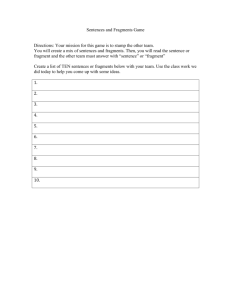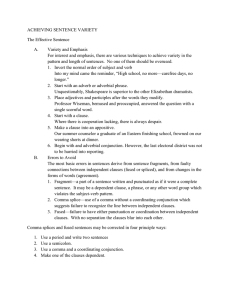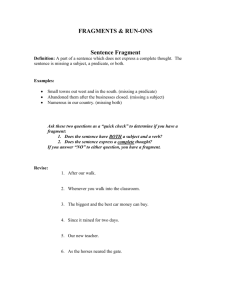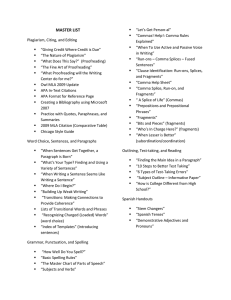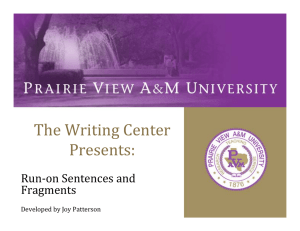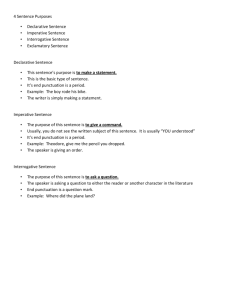Editing and Making Sense of Sentences Independent Clauses
advertisement
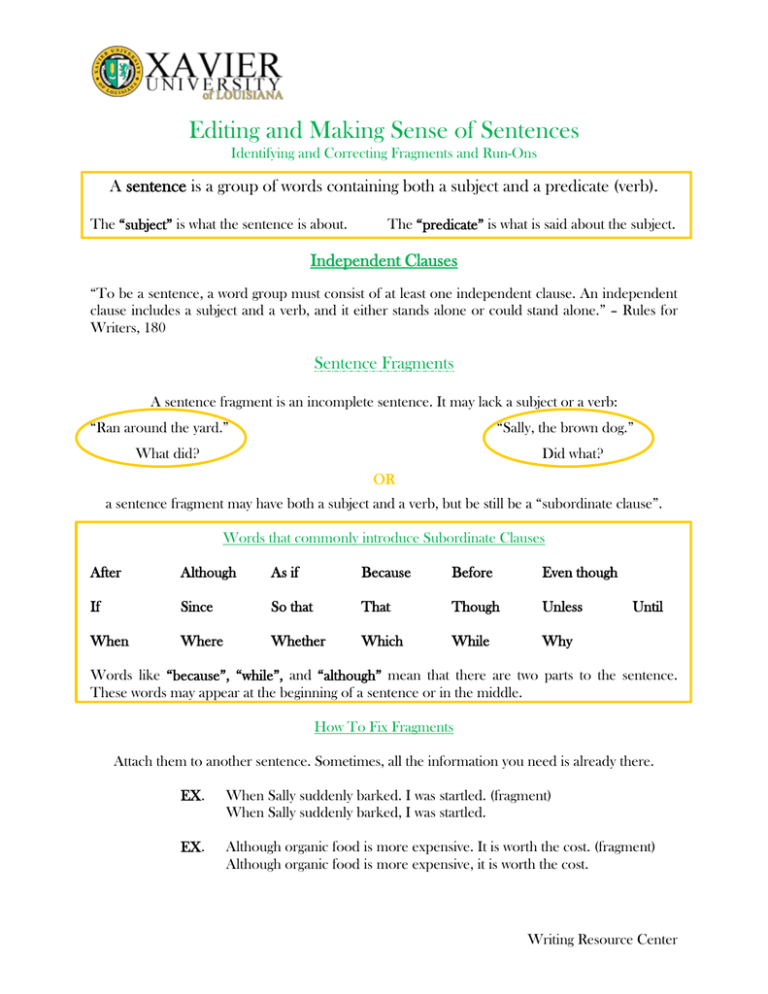
Editing and Making Sense of Sentences Identifying and Correcting Fragments and Run-Ons A sentence is a group of words containing both a subject and a predicate (verb). The “subject” is what the sentence is about. The “predicate” is what is said about the subject. Independent Clauses “To be a sentence, a word group must consist of at least one independent clause. An independent clause includes a subject and a verb, and it either stands alone or could stand alone.” – Rules for Writers, 180 Sentence Fragments A sentence fragment is an incomplete sentence. It may lack a subject or a verb: “Ran around the yard.” “Sally, the brown dog.” What did? Did what? OR a sentence fragment may have both a subject and a verb, but be still be a “subordinate clause”. Words that commonly introduce Subordinate Clauses After Although As if Because Before Even though If Since So that That Though Unless When Where Whether Which While Why Until Words like “because”, “while”, and “although” mean that there are two parts to the sentence. These words may appear at the beginning of a sentence or in the middle. How To Fix Fragments Attach them to another sentence. Sometimes, all the information you need is already there. EX. When Sally suddenly barked. I was startled. (fragment) When Sally suddenly barked, I was startled. EX. Although organic food is more expensive. It is worth the cost. (fragment) Although organic food is more expensive, it is worth the cost. Writing Resource Center Editing and Making Sense of Sentences Identifying and Correcting Fragments and Run-Ons Or rewrite it as a complete sentence, adding in the missing subject or verb: EX. [I was] Tired from chasing my dog around the yard. EX. I work hard for my classes. For example, often staying up late to study. I work hard for my classes. For example, [ I ] often stay up late to study. EX. I spent all day cleaning. Also lots of time in the garden. I spent all day cleaning. Also, [ I spent ] lots of time in the garden. Seven Coordinating Conjunctions Clever way to remember the seven coordinating conjunctions is the acronym FANBOYS. For And Nor But Or Yet So Run - On Sentences A run on sentence is a sentence with two or more independent clauses that have not been joined correctly. Two common types of run-ons: o Comma Splices o Fused Sentences Comma Splices A comma splice is when a run-on sentence has combined two independent clauses with a comma but without the appropriate coordinating conjunction. This form of run-on is extremely common EX. I finished my application, I was finally ready to send it in Ways To Fix It Add a coordinating conjunction: I finished my application, so I was finally ready to send it in. Turn it into two separate sentences: I finished my application. I was finally ready to send it in. (period) Writing Resource Center Editing and Making Sense of Sentences Identifying and Correcting Fragments and Run-Ons I finished my application; I was finally ready to send it in. (semicolon) Unlike a comma, a semi-colon can be used to join two independent clauses together. It works just like a period; it can be used when you want to connect two separate sentences that are closely related. Rewrite it with a subordinate clause: Since I was finished with my application, I was finally ready to send it in. Fused Sentences A fused sentence combines two or more independent clauses and lacks a coordinating conjunction and proper punctuation: EX. I wasn’t feeling well I stayed home from school that day. I wasn’t feeling well, so I stayed home from school that day. I wasn’t feeling well, and I stayed home from school that day. I wasn’t feeling well; therefore, I stayed home from school that day. Writing Resource Center
